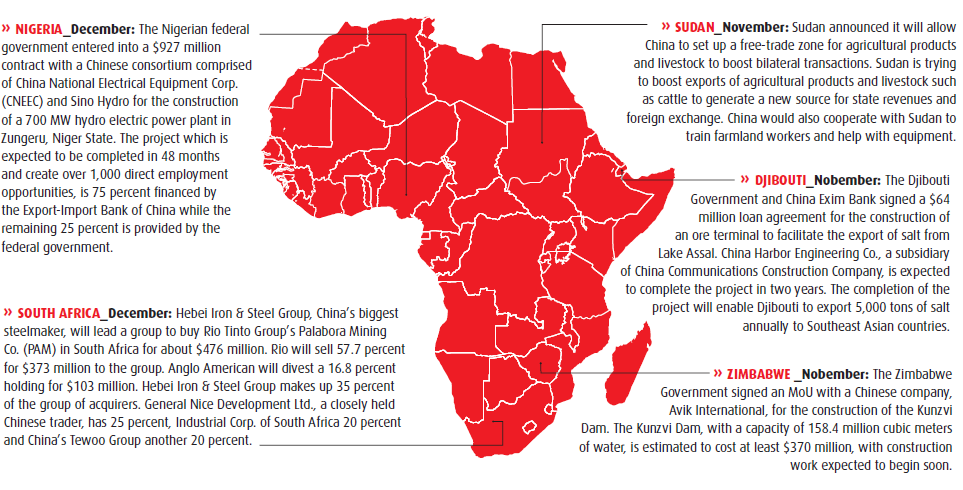|
Pharmaceutical market growth
In 2010, Africa's urban population was estimated at 413 million inhabitants, or 40 percent of the total African population, making Africa more urbanized than India yet less so than China. Analysts predict that by 2030, more Africans will be residing in urban areas for the first time in the continent's history. Currently, the continent has 52 cities with more than 1 million inhabitants. Along with the push toward urbanization in emerging Africa, rising consumer markets across the continent also offer ample opportunities for Chinese companies, mainly driven by rising economic growth across Africa and subsequently an increased middle-income class population. The pharmaceutical industry is just one of many sectors poised for growth along with Africa's growing consumption power.
The size of the pharmaceutical market in Africa is estimated at more than $10 billion, with Egypt, South Africa and Algeria currently the biggest markets, both in terms of revenues as well as volume of products consumed. All three countries generate market revenues of more than $2 billion each, followed by Nigeria, Morocco and Tunisia. A number of multinational pharmaceutical companies, such as GlaxoSmithKline and Pfizer, have established manufacturing facilities in Africa, with an equally significant number of emerging local producers. The Sub-Saharan African pharmaceutical market is driven by the high incidence of diseases such as those of HIV/AIDS, TB and malaria while in North Africa the prevalence of lifestyle diseases such as cardio-vascular diseases, cancer and diabetes is more common.
Consequently, Chinese pharmaceutical companies are recognizing the Africa opportunity. Africa has become China's largest export market for medicine and one of the fastest-growing markets for Chinese medical products. According to statistics from the China Chamber of Commerce for Import & Export of Medicine & Health Products (CCCMHPIE) showed the value of medical products exported from China to Africa from January to September 2012 totaled $1.47 billion, a 13.5 percent increase over the same period of 2011. In fact, the volume of medicine that China exports to Africa is growing at a faster rate than the volume it is exporting to just about any other market, including Europe, North America and Southeast Asia. According to CCCMHPIE, Chinese medical producers exporting medical products to Africa are helping to address the historical shortage of medicine there. The low prices and good quality of China's medical products are the major reason why African importers and distributors choose to buy Chinese-made medical products.
However, there are some risks associated with such a sharp increase in Chinese medicine on market shelves and in hospitals in Africa. The World Health Organization (WHO) in China has called for closer China-Africa cooperation and information sharing to make sure high quality drugs are being taken in the correct dosages. Also substandard or counterfeit medicines intentionally made and sold for profit are putting millions of lives at risk. Fortunately, in 2001, WHO set up a pre-qualification program to facilitate access to medicines that meet unified standards of quality. More Chinese pharmaceutical companies are taking the initiative and enrolling in the program, which will help ensure the safety of African consumers of Chinese medicine and enhance the reliability of Chinese-made medical products worldwide.

The ChinAfrica Econometer is produced by The Beijing Axis, a China-focused international advisory firm operating in four principal areas: Commodities, Capital, Procurement, and Strategy.
For more information, please contact:
Daniel Galvez, danielgalvez@thebeijingaxis.com
www.thebeijingaxis.com |